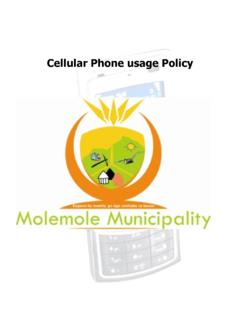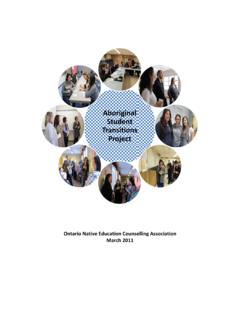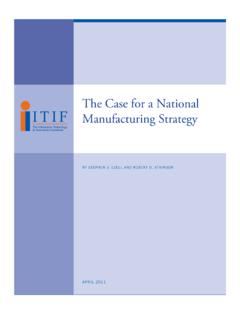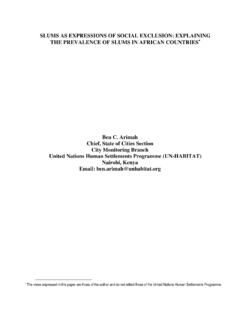Transcription of CHAPTER 1: MAYOR’S FOREWORD AND …
1 CHAPTER 1: mayor 'S FOREWORD AND executive summary . This being my first term as mayor of Molemole Local Municipality and the first annual report for the new term of Council, I have to acknowledge and thank my predecessors for steering this ship to where it is. We have recently emerged from a smooth and incident free political transition resulting in changes in faces constituting the Municipal Council; however, the strategic objective and philosophy of Council remain the same mainly to improve the quality of life of our people. The 2011/2016 term of Council will strive to improve on the achievements of our predecessors and accelerate the provision of the much needed municipal services focusing on the five developmental local government key performance areas: Infrastructure and Service Delivery; Institutional Transformation and Development;. Local Economic Development and Planning; Financial Viability, and Good Governance & Public Participation.
2 We can proudly state that we have taken the necessary steps and stance to fill all critical positions with suitable and competent men and women with a view to injecting the necessary expertise to better the performance our municipality. We have also reconsidered our systems and processes to ensure they efficiently contribute to the reduction and, ultimately, the eradication of our prevalent service backlogs. We take seriously the values of good governance and believe we are capable of turning the tide on unfavorable audit opinions in pursuit of a clean audit as set by the Operation Clean Audit of 2014 target. We need to inculcate in all concerned a culture of excellence, care, accountability and good governance. The turning point for a clean administration and, consequently, audit is not entirely lodged solely on the shoulders of administrators but requires of all of us Council, administration, business and residence to take part and assume our individual and collective responsibility with prestige, impunity and integrity.
3 CHAPTER 4 of the Municipal Systems Act, 2000 compels the municipality to create conditions for communities to participate in its affairs. Our municipality, as a client centered organization, values the role of its stakeholders. We have notably benefited from support programmes and initiatives by external stakeholders, Magoshi, religious groups and sector departments. In view of all the basic service delivery backlogs within our municipality, our municipal officials, together with sector departments, have developed strategies and programmes to address the matter. The current status of basic services backlog shows a decrease in the number of people who do not have access to basic services. With these results to date, it clearly indicates that Molemole Municipality will be one of the municipalities to provide universal access to basic services in 2014. It is, therefore, my pleasure to present to you the following results with regards to basic services: BASIC SERVICES.
4 Water Molemole relies entirely on groundwater for its water supply for primary and agricultural use. However, in the year under review we witnessed a significant decline in the number of household without water supply; a total of 11 745 households benefitted from the 2010/11 water supply projects implemented by CDM. According to Statistics South Africa (Non-Financial Census, 2008) it is confirmed that 19 595 households receive free basic water. Sanitation The 2007 community survey had shown a steady increase in the proportion of households having access to sanitation. Furthermore in the year under review significant progress was made with regard to reduction of households without sanitation facilities. A rural sanitation project for construction of 1000 VIP toilets was implemented benefitting 1000 households. In addition, Mogwadi waterborne sewerage reticulation was implemented with 1000 households connected to the waterborne sewer network.
5 1. Electricity The municipality holds the electrification license for Mogwadi and Morebeng Town and all villages are serviced by Eskom. According to census 2001, 21590. households had access to electricity and the number increased to 25577 household according to the 2007 community survey. The service backlog stands at 1739. households and 6972 households have access to FBE according to Stats SA. Two projects have been implemented and energized during the 2010/2011 financial year benefitting 644 households. Roads Molemole Local Municipality has a road network of 398 km of roads consisting largely of gravel roads. This is one area in which Road Agency Limpopo, Capricorn District Municipality and Molemole Local Municipality must work hard to improve. Economic Analysis. The importance of providing support and opportunities to disadvantaged persons cannot be underestimated.
6 It is thus important that we roll out targeted support programmes to provide the necessary skills and knowledge to organized groups and individuals to venture into relief programmes in order to address the poverty endemic amongst the community. This includes the promotion of self-help subsistence and livelihoods methods, facilitation of economic access and participation through cooperatives to improve the quality of life. Performance Overview. We have made positive strides in the right direction to ensure that sustainable municipal governance principles support our continuous drive to deliver municipal services which reflect our passion for our community needs, which will always be the catalyst to keep us focused on our mandate to serve with pride. We acknowledge that: Our people need clean & drinkable water Our people need decent sanitation facilities Our roads need to be put in a condition suitable for promoting economic development We must create job opportunities for our people to lift themselves out of poverty.
7 Going forward, Council and communities must unequivocally strive towards the eradication of key municipal developmental and service delivery challenges. This calls for joint planning that prioritizes core challenges into implementable projects and interventions. I, therefore, beseech you, my Council, administration and my people to join me on this demanding, challenging, but conquerable journey. Kopano ke Maatla, Go aga Set haba se kaone! Wa lena Hon. mayor Pauline Makgato Molemole Local Municipality 2. CHAPTER 1: executive REVIEW BY THE MUNICIPAL MANAGER. The importance and relevance of an annual report in an accountable, participatory and developmental orientated local government as a valuable assessment tool cannot be over-emphasised. The 2010/2011 financial year has come to an end and, as required by section 127 of the Municipal Finance Management Act no 56 of 2003, we must table and adopt an annual report for the eventfull 2010/2011 financial year within the prescriped time frames.
8 The report is not only a compliance matter but provides a fair presentation of the perfomance of the municipality for the year under review. Our attitude to the annual report is that all our key stakeholders and partners Council, traditional & community leaders, administration, communities and business must take a keen interest in tracking and reviewing municipal perfomance. Thus the annual report provides one such an opportunity. This essential exercise is vital in shaping and influencing our individual and collective plans, processess and services in our future development. The 2010/2011 Integrated Development Plan set objectives and targets to be realised during the financial year which provides the basis for performance monitoring, measurement and evaluation. The Integrated Development Plan has amongst others set objectives and targets to improve bulk water supply sources, water reticulation, electrification, access roads, financial viability, good governance and public participation.
9 The ministry and department of Cooperative Governance and Traditional Affairs have during the year under review rolled out the Local Government Turnaround Strategy initiatives in which we also participated. In assessing our level and standard of performance as a municipality against our entrusted mandate we should do so in full cognisance of our unique context, prevalent environment and conditions, limited resources, global economic factors impacting at the levels of both Council and residents as well as increases in service input costs versus a decreasing revenue basket. We remain heavily dependent on grant funding. The total realized revenue for 2010/2011 amounts to R 82 939 in comparison to R 85 437 for the prior year translating to 3% year on year decrease. The total value of grant funding for the year is R 67 389 translating to 81% of total revenue whilst own funding totaled R 15 550 representing 19% of total revenue.
10 The increase in bad debts is attributable to the general decline in affordability levels, residents' rates boycott, increased unemployment, the poverty & social grant dependency rate and the low revenue base. The ever increasing bad debts impact on the liquidity standing of the municipality. The low revenue collection rate compromised funding for planned projects and inherently limits the municipality from exploring reprieve mechanisms such as debt write-off. The decline in revenue and the contrasting general price increases have had a knock-on effect on planned performance. These factors have adversely impacted on the ability to implement fully our committed plans and projects. Of great significance to note are opportunities created by our supply chain management processes which contributed to the development of the local economy through procurement of services, thereby addressing a whole range of socio-economic challenges including unemployment.


















